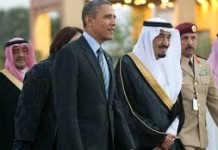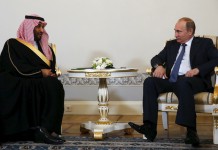Context
 During his visit to Washington in May, President Hamid Karzai of Afghanistan announced that his country would involve Pakistan in reconciliation with the Taliban. The change of heart apparently came at US prodding; realizing Pakistan’s major role in the peace process is essential in order to bring peace to the country. However, these positions are not as clear-cut yet and keep fluctuating based on events and interests of different players.
During his visit to Washington in May, President Hamid Karzai of Afghanistan announced that his country would involve Pakistan in reconciliation with the Taliban. The change of heart apparently came at US prodding; realizing Pakistan’s major role in the peace process is essential in order to bring peace to the country. However, these positions are not as clear-cut yet and keep fluctuating based on events and interests of different players.
PoliTact is examining the US strategic dialogue with Pakistan, Afghanistan and India in a series of articles. This particular analysis looks at the recent US-Afghan talks and its impact on India and Pakistan.
Analysis
Afghan President Hamid Karzai ended his four-day visit to the US on May 14th. The President, who was accompanied by a delegation consisting of top Afghan government officials, received a warm welcome and full pampering at the White House, as both sides tried to mend the recent rift in bilateral ties. The scene and atmosphere was somewhat similar to US-Pakistan talks held earlier from March 24-25 and the just concluded US-India talks. During the talks US has been paying special attention to cultivating and diversifying its relation with multitude of existing and emerging players from the region.
The broad-ranging discussions between the officials of the US and Afghanistan, revolved around:
- Military operations in Southern Afghanistan (upcoming Kandahar operation) and the issue of civilian casualties.
- The Reconciliation process and the Peace Jirga.
- Planned US withdrawal from Afghanistan by summer of next year.
- Training of Afghan Army and Security Personal.
- Women’s rights.
- Economic development.
- Drug smuggling and corruption.
President Obama assured Karzai that the United States would stay in Afghanistan for the long term, just as he pledged to follow his plan to initiate troop withdrawal by July of next year. This has been a keen worry of the Karzai government, which recently demonstrated if US was unwilling to give his leadership credibility, it has the option to turn to Russia and China.

Karzai’s desire to engage Pakistan represents a major shift, not so long ago he was against offering the country any role in the reconciliation process. The ties between Kabul and Islamabad had deteriorated markedly during former Pakistani president Pervez Musharraf’s era when Kabul frequently blamed Pakistan for not doing enough to root out Taliban and Al-Qaeda fighters operating from FATA. In July 2009, Hamid Karzai went to the extent of threatening to send troops inside Pakistan, like the US has done on a number of occasions, to confront militants carrying out cross border raids against the Afghan and coalition forces.
However, Pakistan’s new democratic government led by President Asif Zardari has steadfastly shown willingness to improve ties with the Karzai government. The two countries appear to be committed to cooperate with each other on various strategic and defense related matters.
In March 2010, Karzai visited Islamabad and in a joint press conference with Prime Minister Gilani he declared that without Pakistan’s cooperation, Afghanistan couldn’t be stable or peaceful. The two sides also expressed determination to initiate policies and projects premised on utilizing the full potential of their human and natural resources. They agreed to evolve joint strategies for early implementation of trans-Afghan energy projects, with particular focus on CASA-1000 and Turkmenistan-Afghanistan-Pakistan-India Gas Pipeline (TAPI). Furthermore, to undertake quick completion of Peshawar-Jalalabad Expressway and finalize the feasibility study of Peshawar-Jalalabad rail link.
Karzai’s change of heart could be linked with US pressure on Pakistan to take action against Afghan Taliban in North Waziristan, and thus force them to the negotiating table. Additionally, Karzai wants Pakistan to allow trade between Afghanistan and India via the overland route. According to one hypothesis improving economic relations will lead to enhanced trust between parties involved. However, US is opposed to Pakistan developing energy or economic relations with Iran, such as through Iran-Pakistan-India Gas Pipeline Project, which is considered an alternative to TAPI Project.
On the other hand, Pakistan seeks a greater role in the Afghan reconciliation process and wants Kabul to stop catering to Indian influence and to abandon fueling the Baloch insurgency and harboring Baloch dissidents. Commander of Pakistan’s Frontier Corps in Balochistan, Major General Saleem Nawaz, is on record to claim that Kabul-based rebel leader Brahamdagh Bugti is directly controlling the Baloch Liberation Army (BLA) and Baloch Republican Army (BRA) from Afghanistan.
To allay Pakistan’s fears with regard to New Delhi’s involvement in Afghanistan, Karzai, in his recent visit to Islamabad, announced: “Afghanistan does not want any proxy wars on its territory. It does not want a proxy war between India and Pakistan on Afghanistan. It does not want a proxy war between Iran and the United States on Afghanistan. It does not want any big or small country, nearby or far, to engage in any activity against another nation in Afghanistan.”
In the aftermath of US-Afghan and US-India strategic talks and the failed New York Time Square bombing, the mood of the US-Pakistan strategic ties appears to have changed again. Pakistan is once more on the receiving end of warning and threats, just as during the Bush administration. India and Afghanistan have both traditionally blamed Pakistan for fomenting terrorism in the region and for supporting Punjabi Taliban and Kashmiri Jihadist. In the present circumstances, Pakistan’s role in the Afghan reconciliation and US economic aid does not appear to be forthcoming barring it takes action against Afghan Taliban related groups in FATA. This approach is similar to the one adopted by India; there can no dialogue with Pakistan unless it takes action against Punjabi Taliban and Kashmiri Jihadist.
On both ends, Pakistan is making progress. The country has declared it will take action in North Waziristan but it will determine the timing. Pakistan has also stated that the North Waziristan tactics and strategies will be different than the operations it conducted in other parts of FATA. Meanwhile, Pakistan’s Foreign Minister commented this week that the leadership of terror groups have already left FATA and the region, for Somalia and Yemen, due to military pressure. In the aftermath of the deadly terrorist attacks against the Ahmedi religious centers in Lahore, the Punjab government has come under tremendous pressure to act against Punjabi Taliban. The country has already declared a different kind of tactics will be used in dealing with the extremist problem in Punjab.
As Pakistan extend cooperation in dealing with the groups that have decided to attack the Pakistani state, US appears to have bought into Indian and Afghan interpretation of events in the region, and as a result PoliTact expects US-Pakistan relations to deteriorate.
One the one hand the just concluded Peace Jirga in Afghanistan declared reconciliation with Taliban is essential, but on the other hand the coalition forces are undertaking a military surge. This is part of the military and political strategy working hand in hand, along side with emphasis on regional approach. Evaluating the geopolitical environment last year PoliTact had noted: “One can see that each international actor is testing multiple strategies, some perhaps contradictory, as part of an effort to check and counter the moves of the other actors prior to eventual peace talks.” However, that was last year, continuing with the same strategy will only prolong the war and its reach, and create further mistrust regarding US intent amongst the players.
In an attempt to please all or dillydallying over whose interests it wants to protect in Afghanistan, in the present zero-sum environment of the region US risks alienating India, Pakistan, and Afghanistan. Ultimately compromises will have to be made and the delicate act of balancing different leverages and interests cannot go on indefinitely. PoliTact will continue to monitor the evolution of this strategic dialogue.
Tell Us What You Think
Feedback@politact.com



